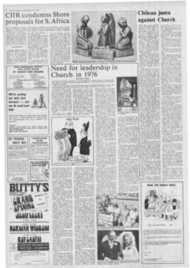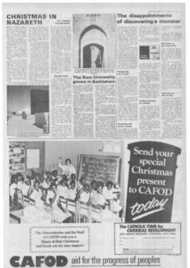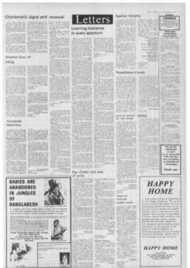Page 2, 26th December 1975
Page 2

Report an error
Noticed an error on this page?If you've noticed an error in this article please click here to report it.
Tags
Share
Related articles
Priests In Chile Arrested
'sort Of Genocide' In Chile
Bomb Blast Hits Argentine Church
King Of Spain Reprieves Fined Priests
Indian Missionaries Evacuate After Murder Of Christian...
Chilean junta against Church
TWO Holy Cross priests said in Washington that their expulsion from Chile in November on charges of harbouring subversives was part of a campaign by that country's military junta against the Catholic Church for aiding the persecuted.
Frs Philip Devlin, 45, of Wray, Colorado, and Daniel Panchot, 37, from Okmulgee, Oklahoma, said the campaign includes planting "false evidence" followed by detention of priests and others, and feeding to pro-government papers allegations against Church personnel. They said: "There is no frontal attack on the Church as a whole. The junta's tactics are to damage the image of the Church and thus diminish its moral authority in the struggle to defend human rights in Chile, and also to divide the Catholic community on the issue of Marxist influence in the country."
A third Holy Cross priest, Fr Gerald Whelan, is under military detention near Santiago in connection with the same incident which led to the expulsion of the priests and three American nuns — an alleged conspiracy to give refuge and medical aid to tots guerrillas of the Leftist Revolutionary Movement. Early in December two Italian missionaries were expelled.
Also jailed on the same charges are four Chilean priests, a British doctor and several lay helpers. Most had connections with the work of the Committee for Peace in Chile. an inter-religious group aiding political prisoners and refugees and their families.
Fr Ponchet said: "I was taken by DINA agents (Chilean secret police) to Villa Grimaldi and subjected to interrogation seven times in 12 hours. They wanted me to implicate others in so called 'subversive activities' under the Peace Committee.
"I was then taken to the DINA chambers at Cuatra Alamos, where I was slapped in the face and punched for refusing to talk. I had taken a copy of the Bible with me, and the agents confiscated it saying it was a 'Marxist Bible'.
"They threatened me with torture in the 'electric chair' when I refused to sign a confession they had prepared. I agreed to sign with objections.
"I was never told on what charges I was arrested, although 1 pressed the matter. They held me incommunicado for several days until taken to the Santiago airport and deported. I had only the clothes i wore at the time of the arrest."
Fr Devlin was charged with harbouring Fr Whelan, who in turn was accused of aiding guerrilla leaders. Fr Devlin managed to find refuge under the protection of American Embassy officials, who arranged for his exit in mid-November. along with the three nuns, Maryknoll Sister Margaret Lipsio, and two members of the School Sisters of Notre Dame, Paula Armstrong and Helen Ann Nelson.
In the case of the two Italian priests, Frs Giuseppe Morinedu and Angelo Rossu, deported from Capiapo, in northern Chile, a mimeograph machine was planted behind the altar of their parish church, along with "Marxist" literature, Fr Panchot said. "Officials also sought to embarrass the bishop."
He added: "Copiapo's military authorities said that either the clergy was going to co-operate with the antiMarxist government, or else they could do without them. They indicated that Chileans do not need religion.
"On the other hand, DINA officials claim that in cleaning Chile of Marxists they are doing God's work. They are really fanatics."
In Copiapo, Bishop Fernando Ariztia said accusations against his two priests "are unacceptable unless proven by trial." He added: "I am afraid there is much more behind those arrests," Frs Devlin and Ponchet listed other recent events in Chile as part of an anti-Church campaign: The government banned the return of Bishop Helmut Frenz, a Lutheran, a leading member of the Peace Committee.
Bishop Carlos Gonzalez of Talca was linked to an antigovernment plot by guerrillas: some of those listed as leaders were serving jail terms at the time authorities claimed they were launching the alleged plot.
The home of Auxiliary Bishop Enrique Alvear of Santiago, also a leader in the Peace Committee, has been raided three times by police on what they said was "a search for fugitives." He has spearheaded efforts to locate missing persons after relatives reported their arrest.
Government agencies and communications media give repeated display to alleged incidents purporting to show dissent among Catholic leaders. and give unusual prominence to statements against those priests under detention.
The government contends that Church-State relations remain cordial in spite of "isolated incidents" involving a few churchmen and women "infiltrated by Marxists."
It "over-played" statements attributed to Bishop Carlos Camus, secretary general of the Chilean Bishops Conference, as admitting that some Marxists found jobs in the Peace Committee, since ordered dissolved by President Augusto Pinochet.
In off-the-record remarks to foreign correspondents, Bishop Camus was critical of government policies, according to a reporter who violated the confidentiality of his comments. Education and welfare officials made repeated efforts to sow distrust among people in
slums against the neighbourhood "children's kitchens" and other relief by Church groups. Fr Devlin said: "This is one of the reasons Fr Whelan. was accused of promoting 'political meetings', when he sponsored these kitchens in his slum parish at Las Condes."
Church personnel involved in the Peace Committee aid to political prisoners and refugees went on record saying their motivation was Christian charity, not politics.
Fr Devlin said: "Anybody doing pastoral or educational work who might lead the people to launch their own independent organisation, or revive the old ones, like the Young Christian Workers, the campesino cooperatives or some trade unions, is looked upon with suspicion by the iunta and its secret police.
"Sooner or later, that priest, nun or lay leader will be arrested or, if it happens to be a foreigner, deported, under charges of sedition. The authorities excel at the misuse of the 'Marxist' label on anyone pushing for social justice."
blog comments powered by Disqus









